Nearly twenty years ago, while scouting fruitlessly for mountain goats in a remote Idaho unit, I ran into an old cowboy. Discouraged, I asked him where I might find the goats in that God-forsaken country. He moved his chaw into his left cheek, smiled and said,
“Got Harses?”
I did and soon he was scratching a map in the dirt with a short stick. The next weekend, I made a 10-mile trip by horseback to the remote peak he said held goats. Just a minute after setting up the spotting scope, I could see furry white dots scattered amongst the cliffs. Had it not been for horses, I might have never found that country.
My grandfather was a sheepherder in the 1940’s and relied on horses to make a living. He passed all that knowledge to my father who made sure I had the chance to experience one of God’s greatest gifts to mankind: the saddle horse.
I’d rank horses near the top of my “must-have” gear list. The majority of the big deer I’ve killed have come on horseback hunts deep in the backcountry. Horses get me in, help me hunt effectively, and get me and my buck back out. However, horses are not without challenges and danger. Logistically, they are a lot of work. On some hunts, horses are more trouble than value. Often, once I’m in the deer country, I don’t need to cover much ground. The bucks don’t and it’s just a waiting game to catch them in a stalkable position. On these hunts, I’m often caring for horses as much as I’m hunting. I wish I could train them to go home and come back the last day.
Yet on many hunts, especially when the snow piles up and the hunting gets good, there is no better gear than a good saddle horse. In a comfortable camp with wood heat and a place to get dry and recharge every night, I can really put the pressure on the bucks. I’ve hunted as long as 15 days in relative comfort from a good horse camp. It is often on these hunts that I’m succcesful—I can wear the bucks down before the hunt wears me down. Without horses, after about four days of crawling in a cold tent that I can’t stand up in, home starts sounding pretty good.
Although I’ve had horses from earlier than I can remember, I’m really no expert. Many a cowboy and professional trainer far exceed my knowledge and experience. However, I have paid a pile of tuition to the school of hard knocks over the last 40 years of consciousness. I thought I’d start a new blog category—”Got Harses?”—and share a little horse sense with those interested. Check in the next few months as the scouting season gets rolling. I’ll share some stories, tips, and videos on how I care for, train, use, and enjoy horses. Our horses are some of my best (and worst) friends, so there’s rarely a dull moment. Even if you never put a boot in a stirrup, you might learn a bit about hunting as our ancestors did.



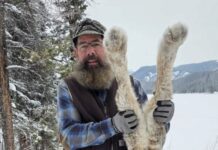
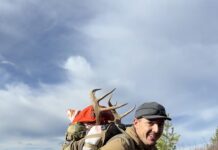

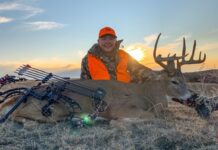
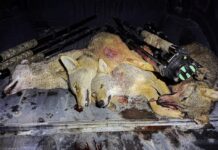
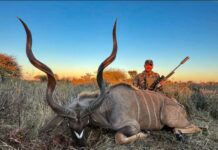
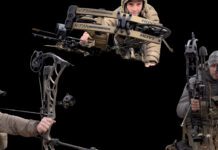
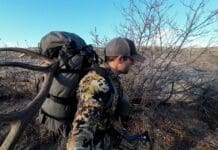


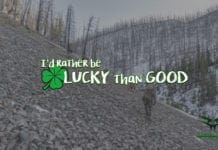






Robby,
I do not have horses and may never have horses, but I still find this information very interesting. Thanks.
You’re welcome, Michael. I hope you get to experience a good horse someday.
I can’t wait for everything with this topic.
super excited to hear info and tips and learn more.
Robby, looking forward to it! I often hunt with my mule Jed. It is not likely to be the type of ‘hunting with harses’ you are planning to blog about. But I’ve been looking for a good ‘hunting with harses’ blog/forum for awhile now, so am looking forward to it.
Hey Robby,
A friend just turned me on to rock slide VERY COOL sight ! I look forward to your insight on horses, I’m going to Colorado with my horses this year, First time dragging them from to VA to CO. and I think you might have said just what I was thinking, about how much work they will be. that being said, I would like to see some video clips on equipment needed, loading packs and the do’s and don’ts of a taking horses in the back country for the first time. maybe a check list of gear etc.
James, love the name “Jed” for a mule.
Mitch, I”ll see what I can do for you. First, I’d get all my paperwork ready for crossing state lines with your horses. The laws vary per state but usually a Coggins blood test and proof of ownership will get you there. With planning, you’ll be glad you brought your horses to Colorado
Robby,
You’ve obviously been doing this a lot! I’m just curious on why you wouldn’t start off mounted on your lead horse and dally up to your saddle horn? Easy enough to let it go if an impending wreck is happening and it sure saves the boots/pants from getting wet! 🙂 Great blog I enjoyed it.
Hi Mike,
three reasons:
1) Two horses together in this situation with me in the saddle is risking a tangle with me caught in the middle. Can’t always let go of rope.
2) Putting that lead horse between me and the pack horse gives me a level of protection if that pack horse jumps the creek. They will smash you like a bug if you let them, even when you’re in the saddle. You always need to be doing the thinking for the horse in these situations.
3) That lead horse has 8 years experience and is very controllable from the ground. I’d rather train a horse from the ground in this situation.
good question
Mike,
oh yea, forgot to say that you often can’t hold the rope anyway, horse just rips it out of your hand. I’d tried to cross the night before that way and I couldn’t make him go. That is when I tie them together and force the reluctant horse into the water.
Makes sense Robby the only reason I ask is because in those situations, I”ve learned that some of the safest places to be in on top of a horse instead of on the ground but that’s just a summers working around pack stock aside from 12 years of raising/breeding/training quarter horses. There have been a few times where we’ve had stubborn dude horses where a client wasn’t able to control them including getting them to cross a creek or a bridge. We always ran 12′-15′ leads on all the horses (glad you mentioned breakaways they are a HUGE part of packing safely) so by using the lead, a quick single turn around the saddle horn of the guide horse would let you lead a stubborn horse near anywhere, and if held right is near impossible to get stuck. Everyone has their own way of doing things and you’ve obviously have a very successful system setup and know what you’re doing and it’s a poor horseman who doesn’t try to learn something new from another horseman! 🙂
Comments are closed.